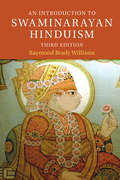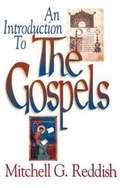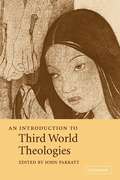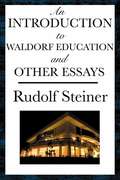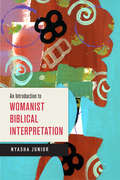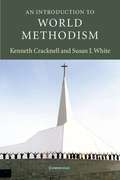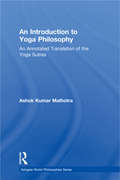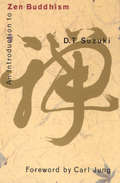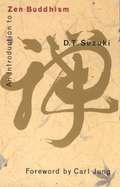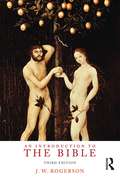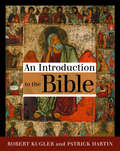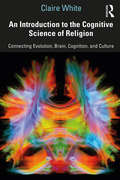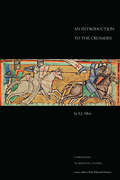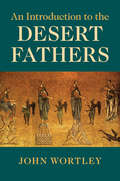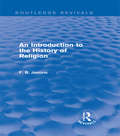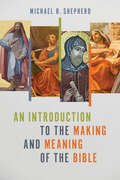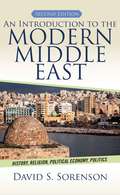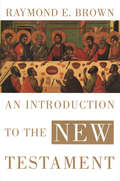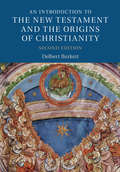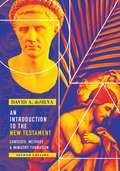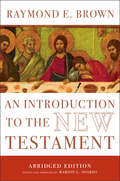- Table View
- List View
An Introduction to Swaminarayan Hinduism (Introduction to Religion)
by Raymond Brady WilliamsAn Introduction to Swaminarayan Hinduism, third edition, offers a comprehensive study of a contemporary form of Hinduism. Begun as a revival and reform movement in India 200 years ago, it has now become one of the fastest growing and most prominent forms of Hinduism. The Swaminarayan Hindu transnational network of temples and institutions is expanding in India, East Africa, the UK, USA, Australasia, and in other African and Asian cities. The devotion, rituals, and discipline taught by its founder, Sahajanand Swami (1781–1830) and elaborated by current leaders in major festivals, diverse media, and over the Internet, help preserve ethnic and religious identity in many modern cultural and political contexts. Swaminarayan Hinduism, here described through its history, divisions, leaders, theology and practices, provides valuable case studies of contemporary Hinduism, religion, migrants, and transnationalism. This new edition includes up-to-date information about growth, geographic expansion, leadership transitions, and impact of Swaminarayan institutions in India and abroad.
An Introduction to The Gospels
by Mitchell G. ReddishAn Introduction to the Gospels is designed to be a textbook for courses on the Gospels, for use at the college and beginning seminary level. Reflecting the most recent scholarship and written in an accessible style, the volume covers all four of the Gospels, including a survey of "the world of the Gospels".The book opens with a discussion of the origin, development, and interrelationships of the Four Gospels. After a chapter-length treatment of each canonical Gospel and the non-canonical Gospels, the work concludes with a discussion of the "historical Jesus" debate.In An Introduction to the Gospels, Mitchell G. Reddish: - provides a solid, convenient survey of the Gospels in an accessible textbook format- presents up-to-date scholarship in a field that has been dominated by older texts- gives a balanced presentation of the content of the Gospels
An Introduction to Third World Theologies
by John ParrattProviding the first overview of the main trends and contributions to Christian thought of Third World theologies, this book gathers essays from experts on Latin America, India, East Asia, West and East Africa, Southern Africa and the Caribbean. It analyzes the common context of the Third World theologies in their experience of colonialism and Western missions, and suggests that they provide different perspectives on what it means to be a Christian in today's world.
An Introduction to Waldorf Education and Other Essays
by Rudolf SteinerCollected here are fourteen essays by Rudolf Steiner covering subjects such as Waldorf Education, The Reordering of Society, The Human Soul, Karma, and Knowledge. These essays are informative and lively. Rudolf Steiner was an Austrian philosopher, literary scholar, educator, artist, playwright, social thinker, and esotericist. His contributions to society were immense.
An Introduction to Womanist Biblical Interpretation
by Nyasha JuniorAn Introduction to Womanist Biblical Interpretation provides a much-needed introduction to womanist approaches to biblical interpretation. It argues that womanist biblical interpretation is not simply a byproduct of feminist biblical interpretation but part of a distinctive tradition of African American women's engagement with biblical texts. While womanist biblical interpretation is relatively new in the development of academic biblical studies, African American women are not newcomers to biblical interpretation. Written in an accessible style, this volume highlights the importance of both the Bible and race in the development of feminism and the emergence of womanism. It provides a history of feminist biblical interpretation and discusses the current state of womanist biblical interpretation as well as critical issues related to its development and future. Although some African American women identify themselves as "womanists," the term, its usage, its features, and its connection to feminism remain widely misunderstood. This excellent textbook is perfect for helping to introduce readers to the development and applications of womanist biblical interpretation.
An Introduction to World Methodism
by Kenneth Cracknell Susan J. WhiteWith over 75 million currently practicing Methodists worldwide, this book treats Methodism as a global religious tradition, examining its rich diversity as well as the core beliefs and attitudes that all Methodists share. It serves as an introduction to the patterns of Methodist life, demonstrating how the religion has developed from British and American roots in different cultural contexts. In addition to the lasting traditions of John and Charles Wesley, An Introduction to Methodism reflects the on-going contribution of Methodism to the ecumenical movement and inter-religious relations. Its analysis includes abundant resources encouraging further study. Kenneth Cracknell is Professor of Theology and Global Studies at Brite Divinity School, Fort Worth, Texas. He has been a theological teacher in Nigeria, a Methodist pastor in Britain, and Director of Interfaith Relations for the British Council of Churches. He has also been a consultant to the World Council of Churches on interfaith issues since 1979 and has visited churches in all parts of the world. He is the author of Toward a New Relationship: Christians and People of Other Faith (Epworth Press, 1986) and Justice, Courtesy and Love: Theologians and Missionaries Encountering Other Religions 1846-1914 (Epworth, 1995). Susan J. White is Alberta H. and Harold L. Lunger Professor of Spiritual Resources and Disciplines at Brite Divinity School, Fort Worth, Texas. She has been a member of the Church of England Liturgical Commission, and the Joint Liturgical Group of Great Britain and Ireland, and consultant for liturgical revision to the Methodist Faith and Order Committee and the Office of Worship of the Board of Discipleship of the United Methodist Church. She is the author of Groundwork of Christian Worship (Epworth, 1997) The Spirit of Worship: The Liturgical Tradition (Orbis Books, 2000) and A History of Women in Christian Worship (Pilgrim Press, 2003)
An Introduction to Yoga Philosophy: An Annotated Translation of the Yoga Sutras (Ashgate World Philosophies Series)
by Ashok Kumar MalhotraWith its promise of personal improvement, physical well-being and spiritual enrichment, yoga is enjoying a resurgence in popularity at the turn of the third millennium. To unravel the mystery of the discipline, its philosophies and relevance in contemporary life, the original text of the Yoga Sutras of Patanjali must be explored. This book offers the first accessible translation and commentary on Patanjali's Yoga Sutras. An introductory section examines the multidimensional aspects of yoga as philosophy, psychology, science, and religion, as well as exploring popular versions of yoga in the West. The core of the book offers a new translation of the entire text of the Yoga Sutras, in a language that is clear and comprehensible to students. Commentaries are presented to highlight the meaning of various statements (sutras) and key themes are outlined via sectional summaries. A full glossary of key words and names is also provided. Concluding chapters look at yoga in contemporary life, revealing the popularity of yoga in the 21st century through Star Wars, and exploring yoga's connection to health and science, contrasting yoga's holistic view of healing with that of the limited view of present day medical science. Sample physical, breathing and meditation exercises are provided. An Introduction to Yoga Philosophy offers a comprehensive introduction to the Yoga Sutras text of Patanjali to all students and interested readers of Indian philosophy and religion, world religions, east-west psychology, and mysticism.
An Introduction to Zen Buddhism
by D. T. Suzuki Carl JungOne of the world’s leading authorities on Zen Buddhism, D. T. Suzuki was the author of more than a hundred works on the subject in both Japanese and English, and was most instrumental in bringing the teachings of Zen Buddhism to the attention of the Western world. Written in a lively, accessible, and straightforward manner, An Introduction to Zen Buddhism is illuminating for the serious student and layperson alike. Suzuki provides a complete vision of Zen, which emphasizes self-understanding and enlightenment through many systems of philosophy, psychology, and ethics. With a foreword by the renowned psychiatrist Dr. Carl Jung, this volume has been generally acknowledged a classic introduction to the subject for many years. It provides, along with Suzuki’s Essays and Manual of Zen Buddhism, a framework for living a balanced and fulfilled existence through Zen.
An Introduction to Zen Buddhism
by D. T. SuzukiThis book provides a complete vision of Zen, which emphasizes self-understanding and enlightenment through many systems of philosophy, psychology, and ethics.
An Introduction to the Bible
by J. W. RogersonA casual reader enters a bookshop looking for a Bible. However, not all the Bibles on display have the same contents! Some have more books than others, some are study editions, some use gender-free language. How did this come about? This Introduction works back through the processes by which the Bible was written, transmitted, copied and declared to be authoritative by various churches. The following topics are dealt with: What is the Bible?; How Biblical Writers Wrote; The Making of the Old Testament; The Making of the Apocrypha; The Making of the New Testament; The Canon of the Bible; The Study of the Bible; The Use of the Bible in Social, Moral and Political Questions. This updated edition takes account of developments in scholarship since the book was first published in 1999 by Penguin. The original edition has been translated into Spanish and Portuguese.
An Introduction to the Bible
by Patrick Hartin Robert A. KuglerMany current Bible “intro” volumes focus more on theories about the biblical text than on the text itself. They lack the simplicity that has become increasingly crucial as basic biblical literacy has declined. Robert Kugler and Patrick Hartin seek to remedy that problem by turning readers back to the text at hand. Their Introduction to the Bible surveys the content of all the biblical books, section by section, focusing on the Bible’s theological themes.
An Introduction to the Cognitive Science of Religion: Connecting Evolution, Brain, Cognition and Culture
by Claire WhiteIn recent decades, a new scientific approach to understand, explain, and predict many features of religion has emerged. The cognitive science of religion (CSR) has amassed research on the forces that shape the tendency for humans to be religious and on what forms belief takes. It suggests that religion, like language or music, naturally emerges in humans with tractable similarities. This new approach has profound implications for how we understand religion, including why it appears so easily, and why people are willing to fight—and die—for it. Yet it is not without its critics, and some fear that scholars are explaining the ineffable mystery of religion away, or showing that religion is natural proves or disproves the existence of God. An Introduction to the Cognitive Science of Religion offers students and general readers an accessible introduction to the approach, providing an overview of key findings and the debates that shape it. The volume includes a glossary of key terms, and each chapter includes suggestions for further thought and further reading as well as chapter summaries highlighting key points. This book is an indispensable resource for introductory courses on religion and a much-needed option for advanced courses.
An Introduction to the Crusades (Companions To Medieval Studies)
by S. J. AllenAn Introduction to the Crusades, part of the Companions to Medieval Studies series, is an accessible guide to studying the complex history of the Crusades. The book begins by defining the Crusades, giving the political and social context of Byzantium, Western Europe, the Islamic States, and Jewish communities to set the scene for crusading from the eleventh century to the end of the medieval period. It then immerses the reader in the logistics of crusading and the day-to-day life of a crusader, explaining arms and armor, strategy and tactics, and siege warfare. Topics explored in depth include women on crusade, pilgrimage, the Mongols, crusade charters, and the use of crusader rhetoric throughout history. A case study chapter on the negotiations for Jerusalem between Saladin and Richard I provides insight into the process of historical inquiry and methods for engaging with primary sources. The book is pedagogically grounded through the inclusion of questions for reflection, sixteen images, four maps, a detailed chronology, a glossary, a "Who's Who" of the crusading world, and a bibliography.
An Introduction to the Desert Fathers
by John WortleyChristian monasticism emerged in the Egyptian deserts in the fourth century AD. This introduction explores its origins and subsequent development and what it aimed to achieve, including the obstacles that it encountered; for the most part making use of the monks' own words as they are preserved (in Greek) primarily in the so-called Sayings of the Desert Fathers. Mainly focussing on monastic settlements in the Nitrian Desert (especially at Scêtê), it asks how the monks prayed, ate, drank and slept, as well as how they discharged their obligations both to earn their own living by handiwork and to exercise hospitality. It also discusses the monks' degree of literacy, as well as women in the desert and Pachomius and his monasteries in Upper Egypt. Written in straightforward language, the book is accessible to all students and scholars, and anyone with a general interest in this important and fascinating phenomenon.
An Introduction to the History of Religion (Routledge Revivals)
by F. B. JevonsFirst published in 1902, this book investigates the history and development of early religion from an anthropological perspective. Rather than dealing with religions that grew from the teachings of their original founders, such as Christianity, Islam, and Buddhism, Jevons considers those religions that were practised as a matter of custom and tradition. The title considers such subjects as the supernatural, life and death, animal sacrifice, and the worship of nature. It provides an introduction to the history of religion for students of religion, anthropology and folklore.
An Introduction to the Making and Meaning of the Bible
by Michael B. ShepherdA comprehensive and orthodox guide to biblical origins and interpretation How did we get the Bible? How do we interpret it? And what does it mean for our lives today? Michael B. Shepherd introduces undergraduates and seminarians to these crucial questions in this reliable and thorough new textbook. Shepherd covers textual criticism, formation of the canon, and history of translation, all while remaining committed to Scripture&’s ultimate purpose—inviting us to salvation through Jesus Christ. Showing how the Bible directs its own interpretation, Shepherd encourages learners to listen to the Word of God, rather than twisting it to fit their own ends. His section-by-section treatment of the Bible encourages students to view the Bible as cohesive, while remaining sensitive to its diverse genres. Thorough and accessible, this textbook goes beyond typical historical introductions to spiritually form students learning to understand Scripture. An Introduction to the Making and Meaning of the Bible is the serious, evangelical introduction your students need and will reference for years to come.
An Introduction to the Medieval Bible
by Frans Van LiereThe Middle Ages spanned the period between two watersheds in the history of the biblical text: Jerome's Latin translation c. 405 and Gutenberg's first printed version in 1455. The Bible was arguably the most influential book during this time, affecting spiritual and intellectual life, popular devotion, theology, political structures, art, and architecture. In an account that is sensitive to the religiously diverse world of the Middle Ages, Frans van Liere offers here an accessible introduction to the study of the Bible in this period. Discussion of the material evidence - the Bible as book - complements an in-depth examination of concepts such as lay literacy and book culture. This introduction includes a thorough treatment of the principles of medieval hermeneutics, and a discussion of the formation of the Latin bible text and its canon. It will be a useful starting point for all those engaged in medieval and biblical studies.
An Introduction to the Modern Middle East
by David S. SorensonCombining elements of comparative politics with a country-by-country analysis, author David S. Sorenson provides a complete and accessible introduction to the modern Middle East. With an emphasis on the politics of the region, the text also dedicates chapters specifically to the history, religions, and economies of countries in the Persian (Arabian) Gulf, the Eastern Mediterranean, and North Africa. In each country chapter, a brief political history is followed by discussions of democratization, religious politics, women's issues, civil society, economic development, privatization, and foreign relations. In this updated and revised second edition, An Introduction to the Modern Middle East includes new material on the Arab Spring, the changes in Turkish politics, the Iranian nuclear issues, and the latest efforts to resolve the Israeli-Palestinian dilemma. Introductory chapters provide an important thematic overview for each of the book's individual country chapters and short vignettes throughout the book offer readers a chance for personal reflection.
An Introduction to the New Testament
by Raymond E. BrownFrom the experience of a lifetime of scholarship, preaching, teaching, and writing, Raymond E. Brown covers the entire scope of the New Testament with ease and clarity. He walks readers book by book through the basic content and issues of the New Testament. While a wealth of information is contained in these pages, the work's most impressive features are the basic summaries of each book, a historical overview of the ancient Greco-Roman world, discussions of key theological issues, and the rich supplementary materials, such as illustrative tables, maps, bibliographies, and appendixes. Using this basic data, Brown answers questions raised by today's readers, relates the New Testament to our modern world, and responds to controversial issues, such as those raised by the Jesus Seminar. Every generation needs a comprehensive, reliable Introduction to the New Testament that opens the biblical text to the novice. Raymond E. Brown's An Introduction to the New Testament is the most trustworthy and authoritative guidebook for a generation seeking to understand the Christian Bible. Universally acknowledged as the dean of New Testament scholarship, Father Brown is a master of his discipline at the pinnacle of his career. Who else could cover the entire scope of the New Testament with such ease and clarity? This gifted communicator conveys the heartfelt concern of a beloved teacher for his students, as he walks the reader through the basic content and issues of the New Testament. Those opening to the New Testament for the first time and those seeking deeper insights could not ask for more in a primer to the Christian Bible.
An Introduction to the New Testament and the Origins of Christianity
by Delbert BurkettThis book offers an authoritative and accessible introduction to the New Testament and early Christian literature for all students of the Bible and anyone interested in the origins of Christianity. It is designed primarily for undergraduate courses in the New Testament, biblical studies and early Christianity. There are questions for in-class discussion and written assignment, step-by-step reading guides on individual works, special box features, charts, maps and numerous illustrations designed to facilitate student use. With this textbook and the Bible, the student should therefore have all the necessary basic texts.
An Introduction to the New Testament and the Origins of Christianity (Introduction to Religion)
by Delbert BurkettFirst published in 2002, this book offers an authoritative and accessible introduction to the New Testament and early Christian literature for all students of the Bible and the origins of Christianity. Delbert Burkett focuses on the New Testament, but also looks at a wealth of non-biblical writing to examine the history, religion and literature of Christianity in the years from 30 CE to 150 CE. The book is organized systematically with questions for in-class discussion and written assignments, step-by-step reading guides on individual works, special box features, charts, maps and numerous illustrations designed to facilitate student use. An appendix containing translations of primary texts allows instant access to the writings outside the canon. For this new edition, Burkett has reorganized and rewritten many chapters, and has also incorporated revisions throughout the text, bringing it up to date with current scholarship. This volume is designed for use as the primary textbook for one and two-semester courses on the New Testament and Early Christianity.
An Introduction to the New Testament: Contexts, Methods and Ministry Formation
by David A DeSilvaThis New Testament introduction is different. Many introductions zero in on the historical contexts in which the New Testament literature was written. This introduction goes further--to give particular attention to the social, cultural, and rhetorical contexts of the New Testament authors and their writings. <p><p> Few introductions to the New Testament integrate instruction in exegetical and interpretive strategies with the customary considerations of authorship, dating, audience, and message. This introduction capitalizes on the opportunity, introducing students to a relevant facet of interpretation with each portion of New Testament literature. Rarely do introductions to the New Testament approach their task mindful of students preparing for ministry. This introduction is explicit in doing so, recognizing as it does that the New Testament itself--in its parts and as a whole--is a pastoral resource. <p><p> Each chapter on the New Testament literature closes with a discussion of implications for ministry formation. These integrative features alone would distinguish this introduction from others. But in addition, its pages brim with maps, photos, points of interest, and aids to learning. Separate chapters explore the historical and cultural environment of the New Testament era, the nature of the Gospels and the quest for the historical Jesus, and the life of Paul. First published in 2004, David A. deSilva's comprehensive and carefully crafted introduction to the New Testament has been long established as an authoritative textbook and resource for students.
An Introduction to the New Testament: History, Literature, Theology
by M. Eugene BoringThis thoroughly researched textbook from well-respected scholar M. Eugene Boring presents a user-friendly introduction to the New Testament books. Boring approaches the New Testament as a historical document, one that requires using a hands-on, critical method. Moreover, he asserts that the New Testament is the church's book, in that it was written, selected, preserved, and transmitted by the church. Boring goes on to explore the historical foundation and formation of the New Testament within the context of pre-Christian Judaism and the world of Jesus and the early church. He then examines the individual books of the New Testament, providing helpful background information and methods for interpretation, and revealing the narrative substructure found within each of the Gospels and Letters. This volume includes helpful illustrations, charts, notes, and suggestions for further reading. Sections are laid out in a well-organized manner to help students navigate the content more easily.
An Introduction to the New Testament: History, Literature, Theology
by M. Eugene BoringThis thoroughly researched textbook from well-respected scholar M. Eugene Boring presents a user-friendly introduction to the New Testament books. Boring approaches the New Testament as a historical document, one that requires using a hands-on, critical method. Moreover, he asserts that the New Testament is the church's book, in that it was written, selected, preserved, and transmitted by the church. Boring goes on to explore the historical foundation and formation of the New Testament within the context of pre-Christian Judaism and the world of Jesus and the early church. He then examines the individual books of the New Testament, providing helpful background information and methods for interpretation, and revealing the narrative substructure found within each of the Gospels and Letters. This volume includes helpful illustrations, charts, notes, and suggestions for further reading. Sections are laid out in a well-organized manner to help students navigate the content more easily.
An Introduction to the New Testament: The Abridged Edition
by Raymond E. Brown Marion SoardsSince its publication in 1997, Raymond Brown's Introduction to the New Testament has been widely embraced by modern readers seeking to understand the Christian Bible. Acknowledged as a paragon of New Testament studies in his lifetime, Brown was a gifted communicator who wrote with ease and clarity.  Abridged by Marion Soards, who worked with Brown on the original text, this new, concise version maintains the essence and centrist interpretation of the original without tampering with Brown's perspective, insights, or conclusions. The biblical writings themselves remain the focus, but there are also chapters dealing with the nature, origin, and interpretation of the New Testament texts, as well as chapters concerning the political, social, religious, and philosophical world of antiquity. Furthermore, augmenting Brown's commentary on the New Testament itself are topics such as the Gospels' relationship to one another; the form and function of ancient letters; Paul's thought and life, along with his motivation, legacy, and theology; a reflection on the historical Jesus; and a survey of relevant Jewish and Christian writings.  This comprehensive, reliable, and authoritative guidebook is now more accessible for novices, general readers, Bible study groups, ministers, scholars, and students alike.
